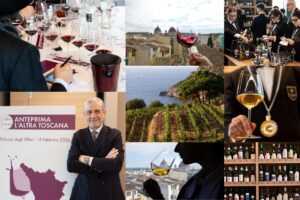
Brunello Cucinelli, one of the most “enlightened” and influential Italian entrepreneurs worldwide, welcomed the Italian and International media (including WineNews that interviewed him. The online video will be available within the next few days, ed.), to a real “Wine Symposium”, held recently in Solomeo. He explained that the philosophy of wine production goes deeper than “Human Sustainability” and “Humanistic Capitalism”. It is “a tribute to Mother Earth”, which has guided him in all his life and work choices. Working in agriculture means “making a “contract” with Creation”, and making quality wine means producing it respecting the land, “caring for and protecting” wineries and vineyards, as well as restoring economic and moral dignity to human beings at work. Further, achieving a balance between profit and donations, towards people, communities, territories and the environment, and according to business logic, which in the fashion and wine worlds (“if we don’t sell pullovers, we can’t produce them”), gives back to and “reinvests” in the Earth the “fair profit” obtained from its products. Solomeo is a small village in the center of Umbria, where the founder of one of the most successful Made in Italy brands began his entrepreneurial adventure, bringing it back to life, and restoring it to the status of “Borgo del Cashmere e dell’Armonia”. It is where his first wine, the red Castello di Solomeo, was created. And, the designer announced that the “fair profit”, obtained from sales, “will be used to build libraries all over the world”.
Castello di Solomeo is a Bordeaux blend from the 2018 vintage, 9.000 bottles produced together with the oenologist, Riccardo Cotarella, in the beautiful Solomeo vineyard. The vineyard is 5 hectares of grapevines planted in 2011 and arranged according to late Renaissance gardens, from Cabernet Franc, Cabernet Sauvignon and Merlot, to which Sangiovese is added to pay tribute to Central Italy’s winemaking tradition. It is a “contemporary” wine (WineNews tasted it in preview, in November 2022, during a meeting in Milan), and a “collectable”. It costs 1.000 euros for a case of 3 bottles (830 euros for the Magnum), and other formats will be available soon (3 liters, 6 liters, 12 liters), inspired by the Supertuscans, Cucinelli explained when he talked about the Marchesi Antinori Guado al Tasso Estate in the “small and prestigious” Bolgheri DOC.
He is trying to live “in harmony and equilibrium with Creation in Solomeo. The village is the place of intellect, while the valley is the work place”, Cucinelli said, torn between the luxury of his high quality cashmere and the constant inspiration of St. Francis, the Saint of Assisi, son of rich fabric merchants, who made poverty his life choice. Cucinelli emphasized that he implemented his initial idea in 2007, as an agricultural project where oil is the other leading product, and “has now been completed by producing its first fruit of the earth, the 2018 vintage wine, created through hard work, care and protection”. Wine is not seen as an end, but as a means to restore “dignity to the land and to the noble work of agriculture”.
Furthermore, to build libraries all over the world, as he believes that “books will never lose their value, and the libraries that keep them and make them accessible to people will always be places of knowledge”, without which even technology, at the basis of many new professions, especially for young people, has no vital force, therefore cannot advance, as Cucinelli has always maintained, convinced of the need to unite it to Humanism. In a circle that wine opens and closes, fruit of the farming culture that unites us all, the designer said, “is one of the noblest values of the human species, relative to Wisdom of which Dionysus was the father, and which governed by Apollo according to what Nietzsche narrates, is the most human and complete form of knowledge”.
Copyright © 2000/2026
Contatti: info@winenews.it
Seguici anche su Twitter: @WineNewsIt
Seguici anche su Facebook: @winenewsit
Questo articolo è tratto dall'archivio di WineNews - Tutti i diritti riservati - Copyright © 2000/2026